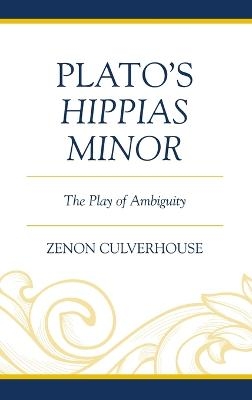
Plato's Hippias Minor
The Play of Ambiguity
Seiten
2021
Lexington Books (Verlag)
978-1-7936-1121-5 (ISBN)
Lexington Books (Verlag)
978-1-7936-1121-5 (ISBN)
This book examines Plato's most puzzling dialogue, Hippias Minor, in detail, treating Socrates' engagement with both Homer and the sophist Hippias over human excellence as at once playful and deadly serious.
Philosophers accuse Socrates of advancing unfair if not fallacious arguments in Plato's Hippias Minor more than most other dialogues. In Hippias Minor, Socrates appears to defend the trickster Odysseus, and in the course of doing so he argues for outrageous claims: the honest person and the liar are no different, and the good person is one who does wrong voluntarily. In Plato's Hippias Minor: The Play of Ambiguity, Zenon Culverhouse argues that Socrates' questionable behavior is no coincidence in a dialogue about deception and that the questions for Socrates are what counts as deception and how it reflects one’s excellence. More broadly, the dialogue is about the relationship between the speaker and what is said, between agent and action. Thus, the dialogue marks an important stage in Socrates' thinking about virtue and voluntary action. As for Plato's portrait of Socrates, Culverhouse argues that the dialogue further defines the sometimes thin line between Socrates and his contemporaries, the sophists. Rather than exploiting ambiguity in key terms of the argument to trip up his opponent, Socrates playfully explores these ambiguities to illuminate Hippias' (and perhaps our own) serious commitments about human excellence.
Philosophers accuse Socrates of advancing unfair if not fallacious arguments in Plato's Hippias Minor more than most other dialogues. In Hippias Minor, Socrates appears to defend the trickster Odysseus, and in the course of doing so he argues for outrageous claims: the honest person and the liar are no different, and the good person is one who does wrong voluntarily. In Plato's Hippias Minor: The Play of Ambiguity, Zenon Culverhouse argues that Socrates' questionable behavior is no coincidence in a dialogue about deception and that the questions for Socrates are what counts as deception and how it reflects one’s excellence. More broadly, the dialogue is about the relationship between the speaker and what is said, between agent and action. Thus, the dialogue marks an important stage in Socrates' thinking about virtue and voluntary action. As for Plato's portrait of Socrates, Culverhouse argues that the dialogue further defines the sometimes thin line between Socrates and his contemporaries, the sophists. Rather than exploiting ambiguity in key terms of the argument to trip up his opponent, Socrates playfully explores these ambiguities to illuminate Hippias' (and perhaps our own) serious commitments about human excellence.
Zenon Culverhouse is associate professor of philosophy at the University of the Incarnate Word in San Antonio.
Acknowledgments
Introduction
Chapter 1: Socrates on Homer, Part 1: 364b3-365d5
Chapter 2: Δύναμις in Action: 365d6-366c4
Chapter 3: Calculated Deception: 366c5-369c2
Chapter 4: Socrates on Homer, Part 2: 369b8-371e5
Chapter 5: “If in fact there is such a person”; 372b-End
Conclusions
Epilogue: The Influence of the Hippias Minor on Aristotle’s Ethics
Bibliography
| Erscheinungsdatum | 17.05.2021 |
|---|---|
| Verlagsort | Lanham, MD |
| Sprache | englisch |
| Maße | 162 x 231 mm |
| Gewicht | 395 g |
| Themenwelt | Geschichte ► Allgemeine Geschichte ► Vor- und Frühgeschichte |
| Geisteswissenschaften ► Geschichte ► Regional- / Ländergeschichte | |
| Geisteswissenschaften ► Philosophie ► Philosophie Altertum / Antike | |
| Geisteswissenschaften ► Sprach- / Literaturwissenschaft ► Anglistik / Amerikanistik | |
| Geisteswissenschaften ► Sprach- / Literaturwissenschaft ► Literaturwissenschaft | |
| ISBN-10 | 1-7936-1121-1 / 1793611211 |
| ISBN-13 | 978-1-7936-1121-5 / 9781793611215 |
| Zustand | Neuware |
| Haben Sie eine Frage zum Produkt? |
Mehr entdecken
aus dem Bereich
aus dem Bereich
auf den Spuren der frühen Zivilisationen
Buch | Hardcover (2023)
C.H.Beck (Verlag)
CHF 27,95
Konzepte – Methoden – Theorien
Buch | Softcover (2024)
UTB (Verlag)
CHF 55,85
Was Pompeji über uns erzählt
Buch | Hardcover (2023)
Propyläen (Verlag)
CHF 44,75


